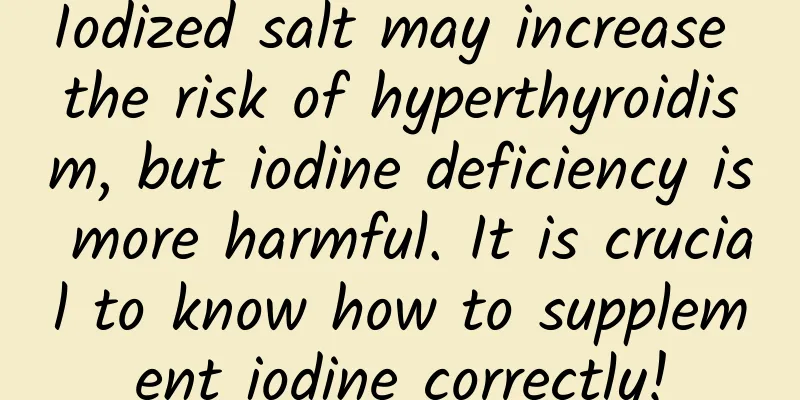Iodized salt may increase the risk of hyperthyroidism, but iodine deficiency is more harmful. It is crucial to know how to supplement iodine correctly!

|
Iodine is an essential trace element for the human body and an important raw material for synthesizing thyroid hormones. It plays an important role in maintaining the health of the body and has physiological functions such as promoting growth and development, regulating metabolism, and participating in brain development. However, my country is one of the countries in the world where iodine deficiency is widely distributed and the disease is more serious. According to a survey in the 1970s, iodine deficiency is prevalent to varying degrees in all provinces, autonomous regions, and municipalities directly under the central government (except Shanghai) in my country. There are nearly 35 million patients with endemic goiter and 250,000 patients with endemic cretinism (cretinism) in the country. Studies have shown that people born and living in iodine-deficient areas suffer from varying degrees of intellectual impairment caused by iodine deficiency, and the IQ of school-age children in iodine-deficient areas is lower than that of children in iodine-sufficient areas. Salt iodization is the safest and most effective measure recommended by WHO and other international organizations to control iodine deficiency. In order to prevent and control iodine deficiency, WHO and other international organizations promote the strategy of universal salt iodization around the world. At present, more than 120 countries and regions in the world have implemented salt iodization policies, and at least 97 countries and regions have formulated laws, regulations or food safety standards to support salt iodization. The implementation of universal salt iodization intervention measures has not only basically eliminated iodine deficiency in my country, but also greatly improved the iodine malnutrition of the population. Is there a link between iodized salt and the high incidence of thyroid cancer? In recent years, the incidence of thyroid cancer has been on the rise. Domestic and foreign scholars believe that there are two reasons for this. On the one hand, the occurrence of thyroid cancer is related to changes in multiple factors such as ionizing radiation, environment, diet, lifestyle, and mental stress; on the other hand, the rate of medical consultation and health examinations has increased significantly, especially the widespread application of high-resolution B-ultrasound and fine needle aspiration cytology diagnosis technology in clinical practice, which has greatly improved the early diagnosis rate of thyroid cancer. At present, there is no evidence that iodized salt is associated with a higher incidence of thyroid cancer. In major countries around the world, regardless of whether iodine supplementation measures are taken or not, and regardless of whether iodine intake increases, remains stable, or decreases, the incidence of thyroid cancer increases, and the increase is mainly in micro-cancers with a diameter of less than 1.0 cm. Although salt iodization has nothing to do with the increased incidence of thyroid cancer, the incidence of hyperthyroidism has been on the rise since my country began to implement salt iodization. Foreign epidemiological surveys have also found that preventive iodine supplementation for all can increase the incidence of hyperthyroidism, including transient iodine-induced hyperthyroidism and Graves' disease. Therefore, it is generally believed that the increase in the incidence of hyperthyroidism is an inevitable process in the process of iodine supplementation to prevent and treat iodine deficiency disease (IDD). Therefore, how to supplement iodine correctly is crucial. How to properly supplement iodine? It depends on the individual and the local conditions. The cause of iodine deficiency is clear. It is caused by iodine deficiency. Prevention is the most important measure. The most basic and main way to supplement iodine is to eat iodized salt. For the general population, as long as they can eat qualified iodized salt, they can ensure iodine nutrition and do not need to eat any iodine-containing health products or iodine-fortified foods. Pregnant women and breastfeeding women should choose iodized salt for pregnant women or iodized salt with higher iodine content. Iodine supplementation needs to vary from person to person 1. Iodine supplementation for the general population Most areas in my country are iodine-deficient areas, and the amount of iodine obtained from drinking water every day is about 10μg; the amount of iodine that the general population consumes from food every day is about 25-50μg; if iodine-rich foods are not specially increased, the iodine that the general population obtains from food and drinking water every day cannot meet the body's needs. If you take 5g of salt a day, plus the iodine you get from drinking water and food, you can reach the recommended iodine intake for the general population. Therefore, except for residents living in areas with high iodine in water sources, other residents should eat iodized salt. 2. Iodine supplementation for special populations (1) Pregnant and lactating women In order to achieve a good iodine nutritional status during the preparation for pregnancy, iodized salt should be consumed. After pregnancy and during breastfeeding, iodized salt for pregnant women or iodized salt with a high iodine content should be used, and the intake of iodine-rich seafood such as kelp and seaweed is encouraged. (2) Children and adolescents Children and adolescents are in a critical period of growth and development. Due to rapid growth, their need for iodine increases. Therefore, children and adolescents should consume iodized salt. (3) Iodine supplementation for patients with thyroid disease 1. Hyperthyroidism Hyperthyroidism patients should limit their iodine intake and avoid iodine-rich foods and medications as much as possible. If radioactive iodine is used to treat hyperthyroidism, foods high in iodine, such as seaweed, should be avoided for at least 7 days. 2. Hypothyroidism If hypothyroidism is caused by complete removal or complete destruction of the thyroid gland, the organs that take in iodine and synthesize thyroid hormones no longer exist or have lost their functions, and the patient needs to receive thyroid hormone replacement therapy. Therefore, consuming iodized salt or non-iodized salt has no obvious effect on the thyroid gland. If the thyroid gland is removed or there is still residual thyroid tissue, a normal iodine diet can be used, including consuming iodized salt. Hypothyroidism caused by iodine deficiency often occurs in iodine-deficient areas, and consuming iodized salt is the most effective method. For hypothyroidism caused by excessive iodine, iodine intake should be limited. 3. Thyroid nodules Excessive or insufficient iodine intake can increase the incidence of nodules, so an iodine-appropriate diet is necessary. If the thyroid nodules have autonomous functions and lead to hyperthyroidism, iodine intake should be limited. 4. Thyroid disease during pregnancy The fetal thyroid gland has the ability to absorb iodine at 10 weeks of pregnancy and can synthesize thyroid hormones after 12 weeks, but the fetal thyroid gland matures after 24 weeks of pregnancy. Therefore, patients with thyroid diseases during pregnancy must also take in enough iodine, and consuming iodized salt is the best way. Pregnant women with autoimmune thyroiditis and hypothyroidism should also monitor their thyroid function regularly and adjust the dose of levothyroxine in time. Patients with hyperthyroidism and a low-iodine diet before pregnancy should consume iodized salt at least 3 months before planning pregnancy to ensure adequate iodine reserves during pregnancy. Patients with hyperthyroidism during pregnancy should also take in enough iodine, monitor their thyroid function regularly, and adjust the dose of anti-thyroid drugs in time. ( 4 ) Patients taking amiodarone Amiodarone, a commonly used drug for the treatment of arrhythmias, has a dose of 200 mg/day, which contains 75 mg of iodine. After deiodination, about 6 mg of free iodine enters the blood. This iodine dose is 40 times the recommended amount of 150 micrograms/day. Therefore, patients taking amiodarone should not only not eat iodized salt, but also reduce their iodine intake, such as eating less seafood. Iodine supplementation should be tailored to local conditions (1) Areas with high iodine content in water sources Residents living in areas with high iodine content in water sources already consume sufficient or even excessive iodine from drinking water. Therefore, these residents should consume non-iodized salt. (2) Coastal areas Although coastal areas produce iodine-rich foods such as kelp and laver, local residents consume them less frequently and in lower amounts. Surveys and studies have shown that the median urinary iodine levels of pregnant women in Shanghai, coastal cities in Zhejiang, coastal cities in Fujian, and rural areas are lower than the standard of 150 μg/L recommended by international organizations, which is a mild iodine deficiency. If residents in coastal areas consume less seafood, their iodine intake may be lower than the recommended intake by international organizations and my country, and the risk of iodine deficiency is very high. Therefore, for residents in coastal areas who consume less seafood, it is recommended to consume iodized salt. Author: Liu Yanping Chen Ye Shanghai Pudong New Area People's Hospital |
>>: Are e-cigarettes really harmless?
Recommend
How to treat leucorrhea purulent
Leucorrhea is a secretion from the female vagina ...
Why are my feet swollen when I am six months pregnant?
Pregnancy should be a very happy thing for women,...
What is the cause of jelly-like vaginal discharge?
With the rapid development of today's society...
What causes stomach pain during early pregnancy?
What many people may know is that women are very ...
Green discharge during pregnancy
The secretions that often appear in women's b...
Why does vaginal itching occur before menstruation?
If you experience vaginal itching before your per...
A woman's period is delayed for a month
In life, it is relatively rare for a woman's ...
What are the procedures for female anal examination?
In recent years, people have paid more and more a...
What is the best treatment for intrauterine adhesions?
Intrauterine adhesion is a common gynecological d...
After suffering from gynecological tumor, "I have poor sleep and don't want to take medicine! What should I do?"
Due to the physiological characteristics of women...
What should women eat if they often stay up late?
Although people's living standards have impro...
Women's private parts
Most women would feel very ashamed if they found ...
Can unmarried women get gynecological diseases?
Many people have a misunderstanding that only mar...









